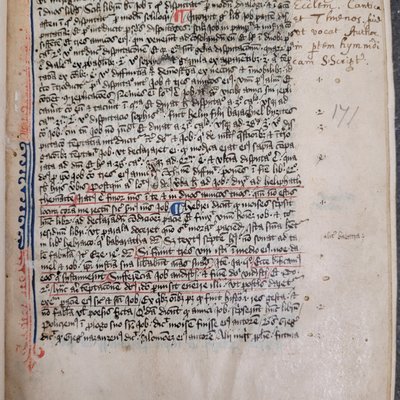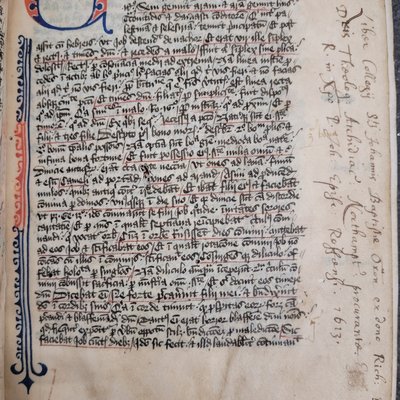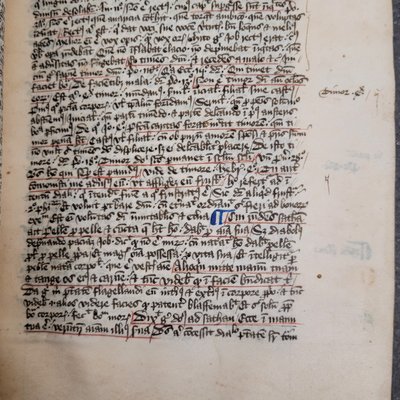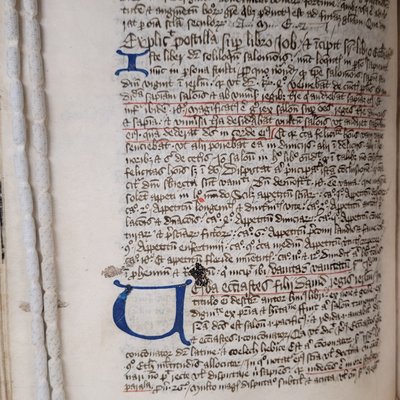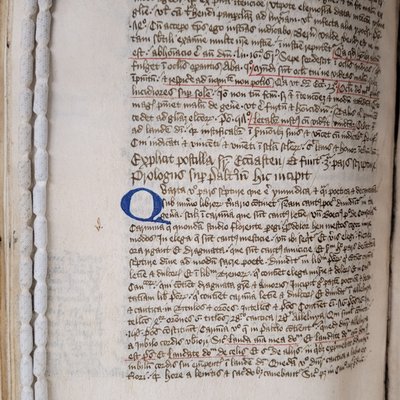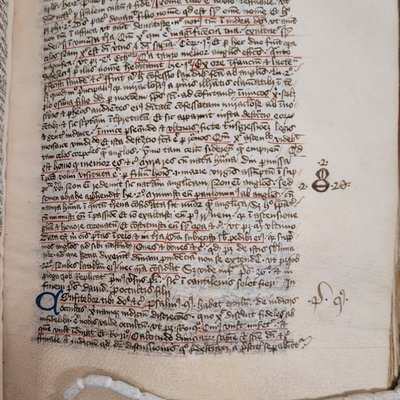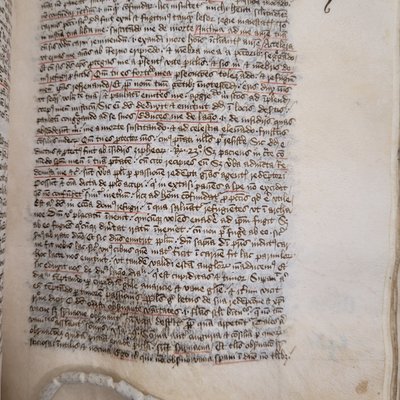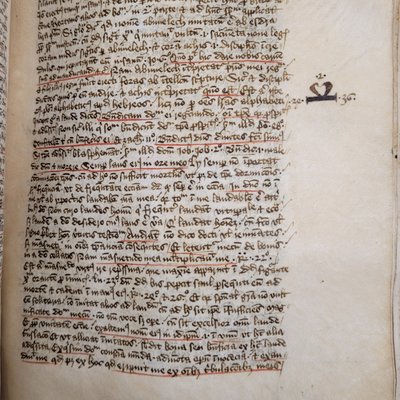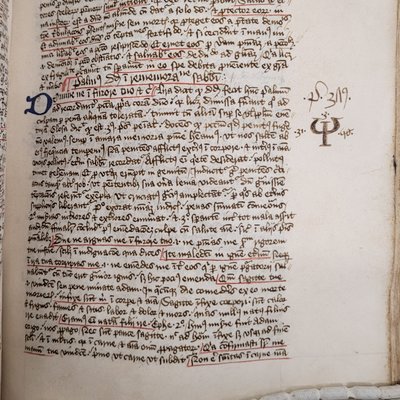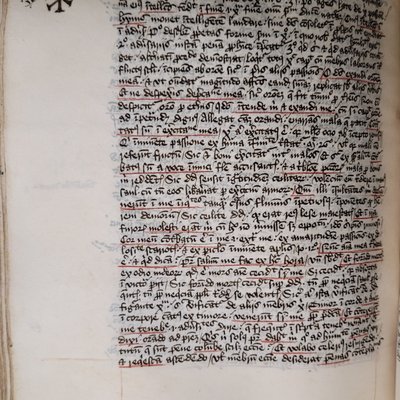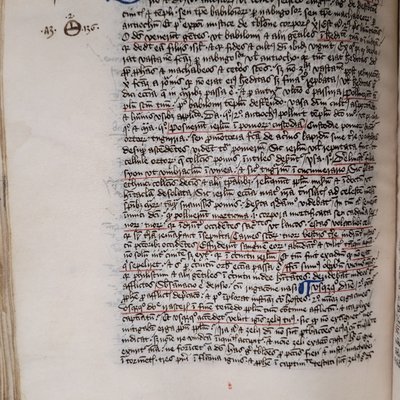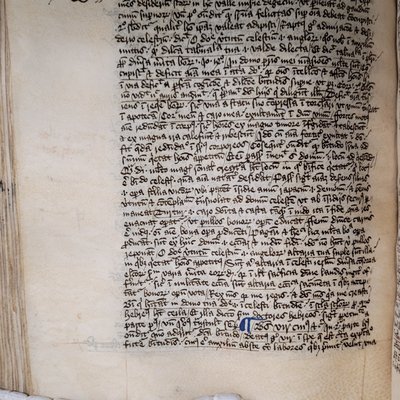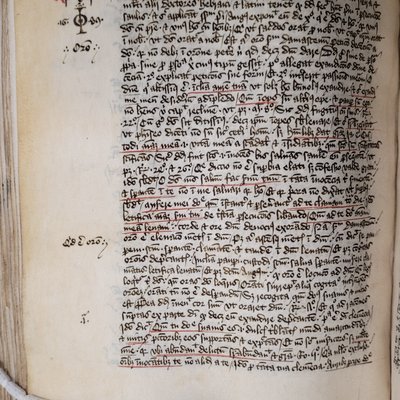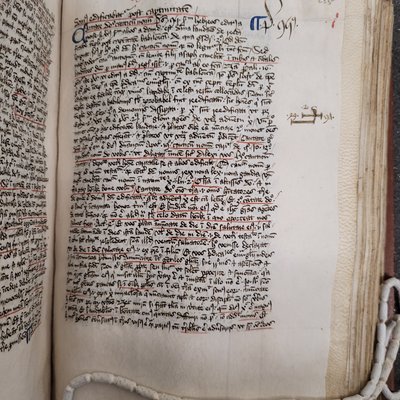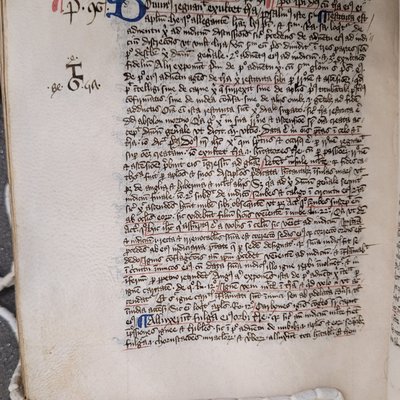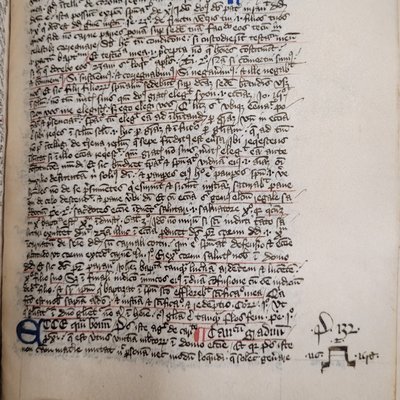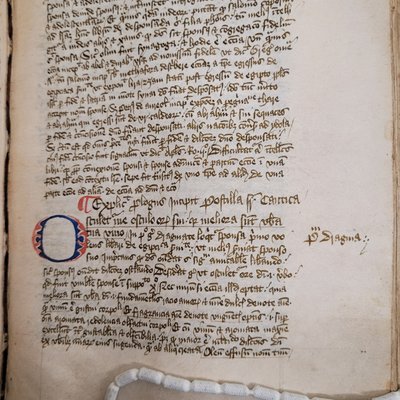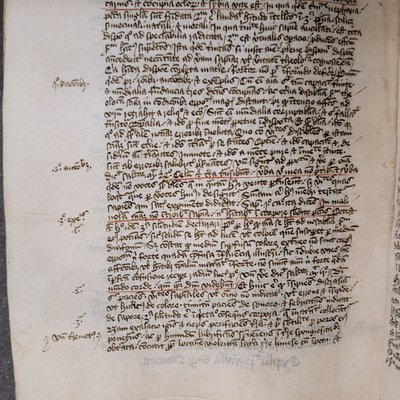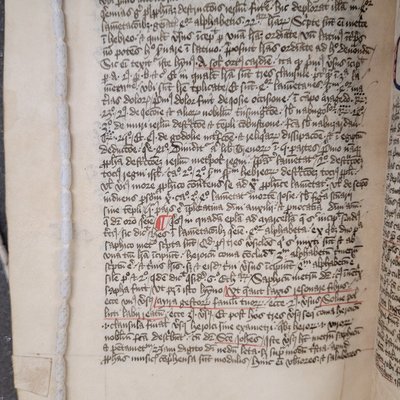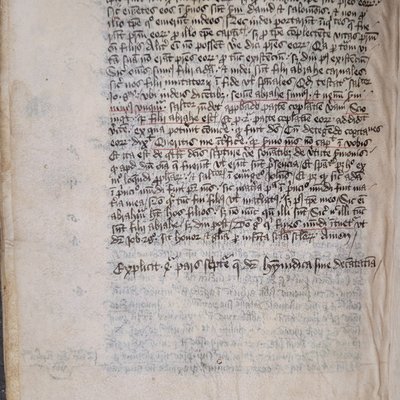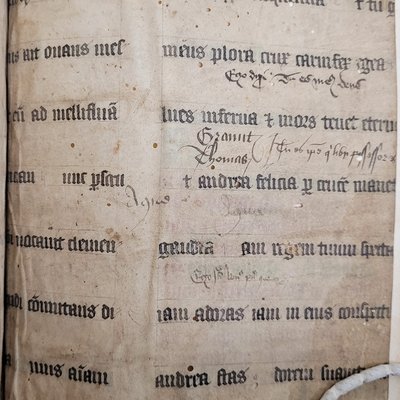April 2023
We are very excited that the unique texts of the renowned Oxford scholar John Wyclif (mid-1320s – 1384) in St John’s College’s MS 171 will soon be digitized as part of our Digitization Project. The freely available digitization will be a valuable source for Wyclif scholarship.
Today, Wyclif is best remembered as the translator of the first complete Bible translation into the English language. At some point before 1394, the chronicler Henry Knighton was the first to connect Wyclif to the late 14th-century Middle English Bible (Hudson & Kenny). It was not Wycliffe himself, however, who translated the Bible, but ‘a large team of academic helpers’ (Hudson & Kenny). Nowadays, the Bible is thus referred to as ‘Wycliffite Bible’ instead of Wyclif Bible to reflect the great scholar’s crucial inspiration for the translation project (Hudson & Kenny).
St John’s College is lucky to hold copies of the Wycliffite Old Testament (MS 7) and the Wycliffite Gospels (MS 79). The subject of this Book of the Month feature is, however, our copy of John’s Wyclif’s Postilla in Biblia (MS 171), which contains the only copies of some of Wyclif’s commentary on the whole Bible. The Postilla has survived only in parts dispersed over a variety of institutions. St John’s copy contains six commentaries on Old Testament books:
- Commentary on Job (fols 1r-64v), otherwise survived only in Oxford’s Magdalen College (MS lat. 117, fols 274r-308r);
all other texts have survived uniquely in the St John’s manuscript:
- Commentary on Ecclesiastes (64v-108v);
- Commentary on Psalms (108v-312v);
- Commentary on the Song of Songs (fols 313r-324r);
- A Tropological Reading of the Song of Songs (fols 324v-363r);
- Commentary on Lamentations (fols 363v-374v).
There is a disagreement about the nature of Wyclif’s Postilla among academics. Traditionally the work is dated to 1371-76 and connected to the Oxford University’s requirement for the degree of Doctor of Theology to lecture on the Bible (Gradon, p. 75). The requirement was to comment on one biblical book only, but, so the argument, Wyclif went beyond the minimum requirement. According to Smalley, the second prologue to the commentary on the Song of Songs (now preserved only in St John’s MS 171, fols 324v-327v) was John Wyclif’s principium, i.e. inaugural lecture, dated to 1372 or 1373 (Smalley 1964, pp. 254-56). Some scholars have come to think that only part of the vast undertaking of writing a comprehensive Biblical commentary was connected to the University requirements, while other parts have different origins, such as ‘the extended debate in the Oxford schools on biblical interpretation between Wyclif and the Carmelite John Kenningham, probably c.1372–3’ (Hudson & Kenny). There is also a suggestion that the Postilla is a result of revisions and was completed only ‘after Wyclif’s “retirement” to Lutterworth’, i.e. after 1381, in an effort to create ‘a corpus of writing to match those of his heroes, Augustine and Grosseteste’ (Gradon, p. 75). The question has been raised if Wyclif’s reference to a glossa privata ‘private commentary’ followed by exact quotations from the Postilla in his final work, Opus evangelicum, is indeed a reference to the Postilla of which St John’s manuscript contains a number of unique texts (Gradon, p. 76; Hudson & Kenny). Whatever the sequence of events behind the production of his Postilla in Biblia, Wyclif produced the first commentary of the entire Bible since the seminal Postillae perpetuae in universam S. Scripturam by Nicholas of Lyra (ca. 1270-1349).
MS 171 has no illustrations and hardly any decorations. Heads of individual books show unflourished red and blue lombards, smaller unflourished lombards are used for chapter divisions. The biblical text is underlined in red. There are, however, marginal notes, including some by readers. A rather unusual type of scribal marginal notes appears in the commentary on the Psalms. Wyclif adopted a system of symbols and cross-references first created by Gilbert of Poitiers (1085-1154) in his Media glosatura in order to ‘facilitate easy movement between non-adjacent but related psalms’ (Kraebel, p. 188). The symbols represent categories of psalms, Arabic numbers above it ‘[indicate] the psalm’s position in the relevant sequence, another to the left identifies the previous psalm in the sequence […] and another to the right points to the next psalm […]’ (Kraebel, p. 188). Wyclif’s symbols are a refinement of those in Media glosatura and at least some of them are visually connected to the categories they represent; most evidently the symbol representing the category, ‘Lamentations for Jerusalem’, which is essentially a T and O map with Jerusalem always located at the cross of the T (Kraebel, pp. 189-90). Kraebel identifies Wyclif as ‘the first medieval commentator to adopt – and improve – the Media glosatura’s cross-index’ (Kraebel, p. 191).
The manuscript has several ownership inscriptions. The earliest, from the end of the 15th century, is that of Thomas Graunt (d. 1474). According to Emden, he joined Oxford’s Oriel College in 1424 to read Theology and he was Senior Proctor of Oxford University in 1430/31. As a member of the clergy, he then went through a series of posts. Graunt must have been somewhat of a bibliophile, as he gave books to Oxford University’s library in 1467, 1471 and 1472/73 as well as to Oriel College and Canterbury College (dissolved 1540) in 1440. A number of other books once owned by him are now in libraries across the UK.
The next recorded owner, with an inscription from the early 16th century, was Nicholas Sykes (d. 1562), who has been identified as a butler of Christ Church. He may have been one of those early Oxford students who financed their studies by serving the college community. Still, he is described as someone who ‘enjoyed the “privileged” status in law accorded to college and university retainers and is among the handful of such privileged persons in sixteenth-century Oxford whose probate inventories contain books’ (Romano, p. 68). This inventory contains 42 titles, but our MS 171 is not on the list (nor is St John’s MS 178, a late medieval miscellany, which had been owned by Sykes, too). The inventory list shows a focus on ‘theological controversies of the Reformation and reflect both Roman Catholic and Protestant opinion’ (Romano, p. 68).
A rubbed or erased inscription names one Christopher Polleins as another previous owner of MS 171. While he remains unidentified for now, the next recorded owners are Alban Butler, who seems to have given the volume to Richard Butler (d. 1612) in 1607. Richard Butler was an alumnus of St John’s College in Cambridge and later became archdeacon of Northampton. Incorporated into Oxford, he received his Doctor of Divinity on the same day as William Laud (Foster). William Laud (1573-1645), of course, is one of Oxford’s St John’s College’s most renowned alumni, later president of the College and rising to the post of archbishop of Canterbury under the patronage of Charles I. Butler, who assisted in examining the case of the last heretic to be burnt at the stake in England, clashed with puritans and was accused of adherence to the Catholic faith (Foster). He shared religious beliefs with William Laud and John Buckeridge (d. 1631). Indeed, Butler bequeathed his books to Buckeridge, then bishop of Rochester (Foster). Buckeridge, another alumnus of Oxford’s St John’s College, became college tutor to William Laud in 1598, and was elected president of St John’s in 1606 (McCullough). MS 171 is among the books that Buckeridge gave to St John’s College in 1613.
A formal catalogue description of MS 171 is available here.
References:
Emden, A. B. (1957-1959), A Biographical Register of the University of Oxford to A.D. 1500, 3 vols (Oxford: Clarendon Press)
Foster, Andrew (2008), ‘Butler, Richard’ in Oxford Dictionary of National Biography at https://doi.org/10.1093/ref:odnb/65644 [accessed 20/04/2023]
Gradon, Pamela (2005), ‘Wyclif’s Postilla and his Sermons’ in Text and Controversy from Wyclif to Bale: Essays in Honour of Anne Hudson, ed. Helen Barr and Ann M. Hutchison, Medieval Church Studies, 4 (Turnhout: Brepols), pp. 67-77
Hudson, Anne, and Anthony Kenny (2010), ‘Wyclif [Wycliffe], John [called Doctor Evangelicus]’ in Oxford Dictionary of National Biography at https://doi.org/10.1093/ref:odnb/30122 [accessed 20/04/2023]
Kraebel, Andrew B. (2020), Biblical Commentary and Translations in Later Medieval England: Experiments in Interpretation, Cambridge Studies in Medieval Literature, 109 (Cambridge: Cambridge University Press)
McCullough, P. E. (2008), ‘Buckeridge, John’ in Oxford Dictionary of National Biography at https://doi.org/10.1093/ref:odnb/3854 [accessed 20/04/2023]
Romero, J. R. (1994), ‘Nicholas Sykes. Butler: Probate Inventory. 1562’ in Private Libraries in Renaissance England: A Collection and Catalogue of Tudor and Early Stuart Book-Lists. Volume 3: PLRE 67-86, edited by R. J. Fehrenbach and E. S. Leedham-Green, Medieval & Renaissance Texts & Studies, 117 (Marlborough, Adam Matthew Publications), pp. 68-75
Smalley, Beryl (1964), ‘Wyclif’s Postilla on the Old Testament and his Principium’ in Oxford Studies Presented to Daniel Callus, Oxford Historical Society ns 16 (Oxford: Clarendon Press), pp. 253-96 [not consulted directly, references taken from Gradon]
